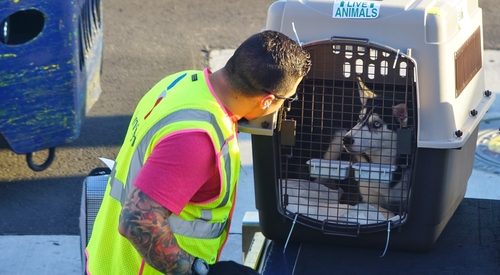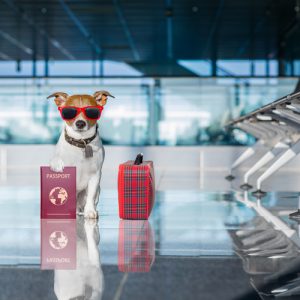Planning a trip abroad and don’t want to leave your pet behind? You’ll need to have your documents in order when it comes time to travel. Some of the procedures must be done well ahead of time so don’t delay when planning an international trip with your pet.
International Requirements When Traveling with Pets
Flying your pet to another country involves quite a bit of research and paperwork. The regulations vary by country, airline, and type of pet. It’s often required for your pet to have blood tests, vaccinations, and possibly even a microchip implanted for identification.
Visit Your Veterinarian

Your first stop when planning an international trip with your pet should be a visit to your vet so you can go over your travel plans and ensure your pet is healthy and fit to travel. A veterinarian will also be able to help ensure your pet gets all the required tests, vaccinations, and paperwork that is required for the specific country you are traveling to.
It’s a good idea to schedule an appointment with your vet months in advance of travel—many vets recommend you start the process at least 6 months before you plan to travel with your pet. There may be medications or treatments that need to be administered before your pet is allowed to travel. Don’t wait until the last minute or you may need to change your flight (and pay change fees) if your pet is not ready to travel in time.
Related: Flying with Pets? Your on-the-Go Checklist for Air Travel
Check Pet Requirements for Your Destination Country

It’s ultimately the pet owner’s responsibility to ensure their pet meets the requirements of the destination country. A good place to start is by checking the U.S. Department of Agriculture-Animal Plant and Health Inspection Service (USDA-APHIS). This site allows you to select your destination country for details on the requirements for each type of pet.
Remember that not all animals qualify as pets and each country has different interpretations of what is considered a pet. Since most countries consider dogs and cats as pets, here’s a look at some general requirements when traveling with a dog or cat to some of the most popular international destinations for U.S. travelers.
Canada
- Dogs older than 8 months and all cats do not require any health certificate.
- Must have a rabies vaccination certificate issued by a licensed veterinarian.
- Unaccompanied dogs under 8 months old require a Health Certificate.
- Dogs under 3 months old do not require a rabies vaccination, but proof of age is required.
- Find out more info about traveling with your dog or cat to Canada.
Mexico
- Must submit either a Health Certificate or an Accredited Veterinarian Certificate that has been issued within 10 days of travel.
- Health Certificate:
- Must be type-written—hand-written documents will be rejected.
- Dates, states, and ages cannot be abbreviated.
- Must be signed (in original ink) and sealed by a Veterinary Services veterinarian.
- Accredited Veterinarian Certificate
- Must be printed on Accredited Veterinarian’s letterhead.
- Must be completed and signed (in original ink) by a USDA-Accredited veterinarian.
- Current rabies vaccination required except for animals younger than three months.
- Animals must be inspected and found to be clinically healthy.
- Animals must be treated against ectoparasite and endoparasite in a period not longer than 6 months.
- Click here for more info on requirements for dogs and cats.
Dominican Republic
- Must submit an International Health Certificate that has been issued within 10 days of travel.
- Current rabies vaccination required; If it’s your pet’s first vaccination, it must be given at least 30 days prior to departure.
- Veterinarian may certify that a rabies vaccine couldn’t be used due to insufficient age.
European Union (Italy, UK, Netherlands, France, etc.)
If you have an EU Pet Passport, you do not need to meet the following requirements. This document can only be issued by an official veterinarian in an EU country and cannot be obtained in the U.S.
- Must be individually identified by a microchip.
- A 15-digit ISO compliant microchip is the world standard.
- If it’s non-ISO compliant, you’ll need to travel with your own microchip reader or verify that the officials in the port of arrival can read your pet’s microchip.
- Rabies vaccination must occur after microchip implantation.
- Pets less than 12 weeks old that have not been vaccinated for rabies are not allowed in most EU countries. View the list here.
- The primary rabies vaccination must be at least 21 days before entry into the EU.
- Primary vaccination is either the first vaccination after microchip implantation or given after a previous rabies vaccination has expired.
- Must have an EU Health Certificate signed (in original ink) by an Accredited Veterinarian and endorsed by APHIS within 10 days prior to entering the EU.
- Dogs are required to have tapeworm treatment within 5 days of entry into the UK, Ireland, Malta, Finland, and Norway.
Jamaica
- Must be permanently identified by an ISO standard microchip.
- Must be vaccinated against rabies after microchip is implanted.
- Must apply for and obtain a Veterinary Import Permit.
- If practicable, dogs and cats must arrive during normal business hours (8:30am-5:00pm Monday – Thursday; 8:30am-4:00pm on Friday). Extra fees apply outside these hours.
- Dog or Cat must arrive directly in Kingston unless otherwise authorized by the Chief Veterinary Officer and must undergo at least 14 days of quarantine upon entry into Jamaica.
- Many other tests and vaccinations are required. Click here for complete information on traveling with your dog or cat to Jamaica.
This is obviously not a complete list and should only be used as a general guide. For complete regulations on traveling with your pet, visit the USDA-APHIS site, and also contact the embassy of the country you are visiting to confirm all of the requirements.
Related: A Look at Therapy Pet Rules by Airline
Check Pet Requirements for Returning to the U.S.

Don’t forget to check the requirements for bringing your pet back home to the U.S. If your pet doesn’t meet Centers for Disease Control (CDC) requirements, it may be denied entry upon arrival to the U.S. and sent back to the country you departed.
There are a few different agencies that regulate pets arriving in the U.S. including the CDC, USDA-APHIS, U.S. Customs and Border Protection (CBP), and U.S. Fish and Wildlife Service (FWS). In addition, there may be certain state-specific regulations. Make sure to check each website before every trip, because these requirements may change depending on disease outbreaks and other factors.
Basic requirements for dogs and cats entering the U.S.
- Must appear healthy and free from infectious diseases.
- Dogs may require a valid rabies vaccination certificate depending on the country of departure and the age of the dog.
- If traveling from certain countries or regions where screwworm is known to exist, dogs must have a certificate signed by a veterinary official from the region stating the dog has been inspected within 5 days of travel and is free from screwworm.
- Unless your departure country is listed free of foot-and-mouth disease, dogs must be free of excessive dirt, hay, or straw, and must be bathed upon arrival and kept separate from all livestock for 5 days after entry.
- Certain dogs used in the handling of livestock in any part of the world other than Canada, Mexico, and regions of Central America and the West Indies must have tapeworm treatment.
- Cats are not required to have proof of rabies vaccination into the U.S., but some states may have their own requirements.
Since pets returning to the U.S. are subject to the same requirements as pets entering for the first time, you may be required to obtain certain vaccinations or health certificates for your pets in the country you are visiting. This would be required if you are traveling for an extended period and need to get a current health certificate before returning to the U.S. Make sure to read the requirements thoroughly before traveling with your pet.
Related: Flying with a Dog? Here's What You Need to Know
Check International Travel Pet Requirements of Your Airline

Finally, your airline may have certain requirements in addition to the country-specific requirements. This usually has to do with how (or if) your pet can be transported by the airline. Depending on the size and breed of your pet, the airline, and your destination, your pet can either travel on the same plane as you (either in-cabin or as checked baggage), be booked on a separate flight and shipped as cargo, or it may need to be shipped through a licensed commercial shipper.
In all cases, your pet must travel in an approved crate that must be large enough for your pet(s) to stand, turn around, and lie down comfortably. There are also maximum flight times that an airline will allow a pet to travel and most airlines will not accept pets on flights longer than 12 hours. And you’ll have to check the weather since airlines will not accept pets on flights where the pet will be subject to extreme weather at any point of the journey. Sometimes there is an outright ban during the summer months for certain airports.
Check the links below for specific requirements by airline when traveling on an international flight.
Alaska Airlines pet policy for international travel
American Airlines pet policy for international travel
Delta Air Lines pet policy for international travel
Frontier Airlines pet policy for international travel
JetBlue pet policy for international travel
Southwest Airlines pet policy for international travel
Spirit Airlines pet policy for international travel
Sun Country Airlines pet policy
United Airlines pet policy for international travel
Note: At the time of writing, Hawaiian Airlines and Sun Country do not accept pets on international flights and Spirit Airlines states that only service animals are accepted on international flights. Allegiant Air currently doesn’t fly to any international destinations.
Keep in mind that there may also be certain requirements for traveling with pets domestically to specific states or U.S. territories, such as Hawaii or Puerto Rico.
If any of your flights involve other carriers, make sure to check the individual airline’s specific policies before you travel. I would recommend calling the airline directly to discuss your travel plans in order to make sure everything is clear.






